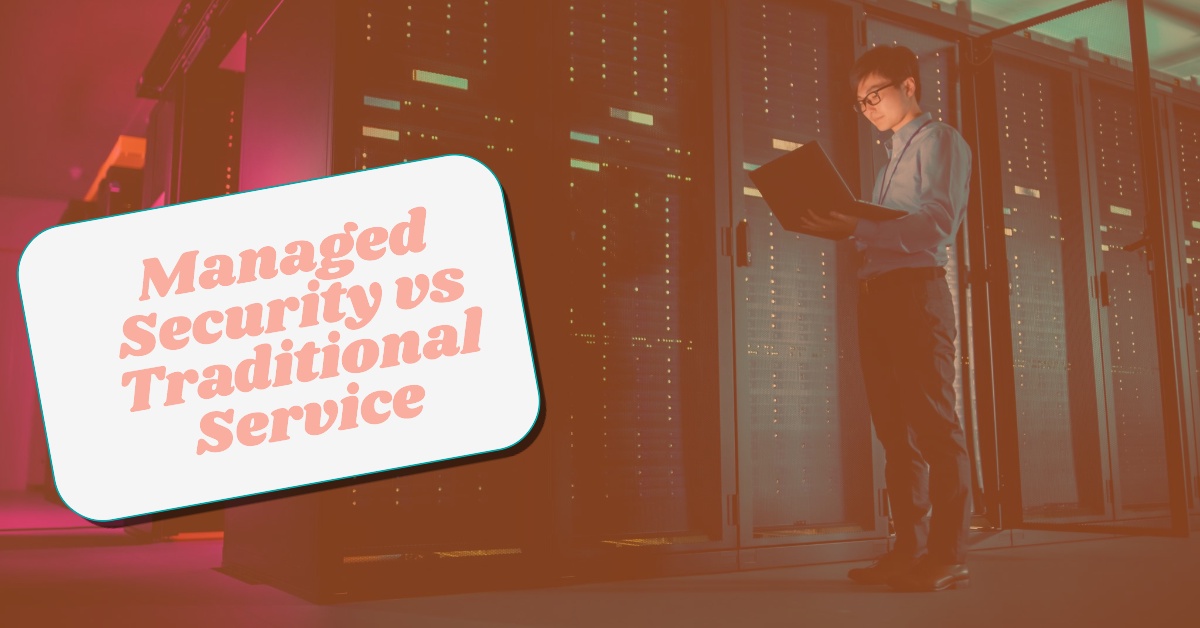Safeguarding confidential information and maintaining network integrity are top priorities for companies of all kinds in today's digital environment. In contrast to the reactive character of conventional security measures, managed security methods provide a proactive approach to cyber Security. Managed Security offers constant monitoring, threat detection, and incident response by specialized professionals, in contrast to traditional services that frequently rely on internal teams or intermittent outside assistance.
Organizations can obtain state-of-the-art technologies, round-the-clock assistance, and customized risk-mitigation methods by outsourcing security operations to specialized suppliers. We'll go more into the main distinctions between Managed Security and traditional services in this blog post, as well as how this cutting-edge strategy strengthens resistance against changing cyber threats. So, stay with us here and keep reading below.
Top 4 Ways Managed Security Differs from Traditional Service
Strong cyber security safeguards are essential when organizations rely significantly on technology. Organizations must implement comprehensive security solutions to protect their digital assets and ensure business continuity in light of the constantly changing threat landscape. Both managed Security, and traditional security methods are essential in this regard. Their methods, strategies, and results, however, vary greatly.
In this article, we'll examine the subtleties between managed Security and traditional security services, outlining how they differ and how each meets the demands of contemporary enterprises in terms of cyber Security. So, stay with us here and keep reading below.
Security Approach
- Traditional Security Services
Traditional security agencies frequently take a reactive stance, depending mostly on perimeter defenses and recurrent inspections. Even with the most expensive security measures, organizations might not have the means or expertise to properly monitor their systems around the clock. They may become more susceptible to new threats and clever attacks that sidestep established defenses as a result of this reactive approach.
- Managed Security Services
With an emphasis on ongoing monitoring and threat intelligence, MSS providers take a proactive approach to Security. In order to identify and address security incidents quickly, they use advanced technologies and hire knowledgeable staff. The round-the-clock protection that MSS providers provide reduces the possibility of breaches and speeds up response times in the case of an incident by utilizing economies of scale and specialized expertise.
Therefore, most companies prefer to get Managed Security Services to ensure the best security measures that eventually protect all your sensitive data more effectively. It uses the latest tech to spot and remove all the vulnerabilities before it affects your network.
Scalability and Flexibility
- Traditional Security Services
It can be difficult for traditional security measures to adapt to new demands. Investing heavily in staff, software, and technology is frequently necessary to scale up internal security infrastructure. Furthermore, conventional security solutions might not be flexible enough to swiftly adjust to new threats or changing compliance needs. Therefore, it could be difficult for businesses that only use traditional security services to sustain an efficient security posture over time.
- Managed Security Services
Scalability is one of the main benefits of managed security services. MSS suppliers can readily scale their offerings up or down in response to the changing needs of the company. MSS providers provide the flexibility to modify security measures in response to new threat vectors or to meet a developing user base. This scalability is especially helpful for companies that are growing quickly or that work in dynamic contexts.
Cost Considerations
- Traditional Security Services
Depending on the size and complexity of the organization's security demands, the pricing of traditional security services might vary greatly. Although in-house solutions could appear more affordable at first, they can result in significant costs down the road due to maintenance, personnel training, and the purchase of hardware and software. Furthermore, the dangers connected to possible breaches and data loss are included in the true cost of traditional Security, which goes beyond financial concerns.
- Managed Security Services
Long-term cost benefits are possible with MSS despite their initial high cost. Organizations can save the initial costs involved in developing and maintaining an internal security infrastructure by contracting out security management to a specialist supplier. To optimize security operations further and maybe lower the total cost of ownership, MSS providers can make use of their knowledge and technological stack.
Compliance & Regulatory Requirements
- Traditional Security Services
If an organization only uses traditional security measures, compliance monitoring may seem like an overwhelming chore. Tight security measures and thorough reporting and documentation are necessary to guarantee compliance with regulatory standards. Organizations face the danger of non-compliance repercussions if they lack specialized skills and devoted resources to keep compatible with increasing rules.
- Managed Security Services
Compliance is crucial for businesses that handle sensitive data or are involved in regulated sectors. Industry-specific laws like GDPR, HIPAA, and PCI DSS compliance are a common area of expertise for managed security companies.
Organizations can get professional advice and support in fulfilling regulatory standards by working with an MSS provider. It can help them avoid expensive fines and reputational harm. Therefore, you can invest in Managed Security Services to modify your security measures and make sure all the security protocols comply with legal requirements.
Which Security Service is good for you?
The necessity for a proactive, flexible approach to defense and the dynamic nature of cybersecurity threats are reflected in the transition from traditional security services to managed Security. Organizations can enhance their cyber security posture by making well-informed decisions and meticulously evaluating organizational requirements, risk concerns, and budgetary considerations. So you can also make wise decisions and invest in the right platform.


No comments yet